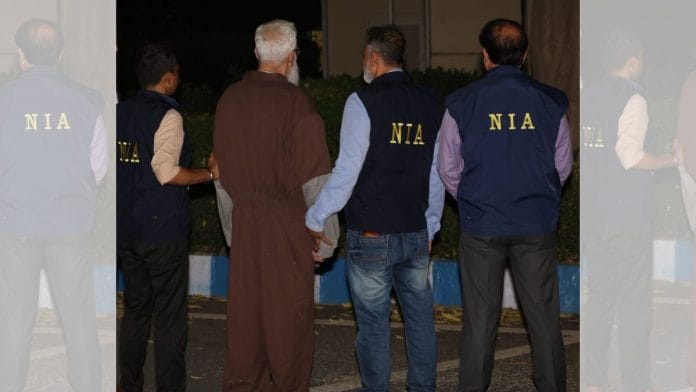New Delhi: Hours after 26/11 terror accused Tahawwur Hussain Rana was extradited to India, the US Department of Justice released a statement hailing the move as “a critical step toward seeking justice for the six Americans and scores of other victims who were killed in the heinous 26/11 attacks”.
The DoJ also referred to him as a Canadian citizen with Pakistani nationality. This comes after Pakistan distanced itself from Rana, a former Pakistan army captain, Thursday, saying that he had not renewed his Pakistani documents for over 20 years.
The statement added that the US authorities completed the extradition process on 9 April. The agencies involved were the Justice Department, Office of International Affairs, FBI Legal Attaché in New Delhi, and the US Marshals Service.
Rana, 64, was brought to India Thursday, ending years of legal proceedings for his extradition in the United States. He is facing 10 criminal charges in India, including conspiracy to commit murder, aiding and abetting terrorism, and forgery, all related to his alleged role in the 2008 Mumbai terror attack—one of the deadliest assaults in Indian history.
The US also released pictures of Rana being handed over to Indian authorities, as U.S. Marshals in California officially transferred him into Indian custody.
The DoJ statement also detailed the convictions faced by Rana in the US.
In 2013, he was convicted in the US for providing material support to Lashkar-e-Taiba (LeT) , and involvement in a separate foiled terror plot against a Danish newspaper. He was sentenced to 14 years in prison.
Although a US court had acquitted him in 2011 of conspiracy in the Mumbai attack, his ties to co-accused David Coleman Headley and LeT formed the basis for India’s extradition request in 2020.
Over two years, Headley allegedly reported his reconnaissance activities and LeT’s attack plans directly to Rana, who, according to prosecutors, expressed approval of the violence.
The statement further mentions that in one intercepted conversation, Rana had reportedly said that the victims “deserved it” and suggested the attackers be awarded Pakistan’s highest military honor, the Nishan-e-Haider. The coordinated attacks, which lasted from 26 to 29 November, 2008, were carried out by 10 militants from the Pakistan-based LeT.
Indian authorities allege that Rana facilitated the planning of the attacks by assisting his childhood friend, Headley (also known as Daood Gilani), who conducted surveillance on behalf of LeT. Headley, a US citizen who later pleaded guilty to terrorism charges, posed as an employee of Rana’s Chicago-based immigration services company to gain access to India. Prosecutors say that Rana knowingly helped Headley open a Mumbai office, despite his lack of qualifications, and submitted falsified visa documents to Indian authorities to aid his movements.
After extensive litigation, a US magistrate judge approved Rana’s extradition in May 2023. His appeals were rejected at all levels, culminating in the US Supreme Court denying his final appeal in April 2025.
Rana was sent to 18 days of judicial custody under India’s National Investigation Agency (NIA) late Thursday night, soon after his arrival in Delhi. He now faces trial under multiple charges, including attempting to wage war, murder and forgery. If convicted, Rana could face death penalty.
(Edited by Mannat Chugh)
Also Read: NIA to grill Rana on 26/11 chain of events as court awards 18-day custody, mandates medical tests






